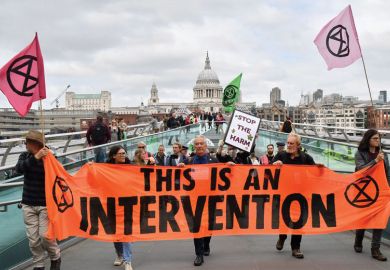Neither science nor spin will halt global warming, writes Mike Hulme.
The origins of this book lie in a specific political goal of the UK Labour Government: to ensure that the G8 Summit at Gleneagles in July 2005 would deliver a progressive international plan of action on climate change. With the US opting out of the Kyoto Protocol and with continued sniping from the scientific fringes about the realities of climate change, the British Prime Minister, as president of the G8, needed a powerful weapon if he were to ensure progress towards action on an international scale. He turned to science for such a weapon.
A conference on Avoiding Dangerous Climate Change was held at the Hadley Centre in February 2005 and brought together about 200 scientists from some 30 countries. For a scientific conference to be announced by a Prime Minister was unusual, and it was even more unusual for him to announce the goals, namely to answer the questions "What level of greenhouse gases in the atmosphere is self-evidently too much?" and "What options do we have to avoid such levels?" That the primary audience he had in mind for the results of the conference was opinion formers in the US is clear from the opening question. Only a constitutional lawyer with an eye on American opinion could have suggested that identifying dangerous climate change was as self-evident as Thomas Jefferson's truths that "all men are created equal" with unalienable rights to life, liberty and the pursuit of happiness.
Does this political context suggest that science was manipulated to serve a political goal? Or indeed that the 200 conference participants and the 108 contributors to this book have been compromised? I do not believe it does, for reasons I will explain in a moment. But what is revealed by the conference and the book is the dead end we are fast approaching in the West in trying to convert the scientific narrative of climate change into a legitimate and empowering global vision.
The first reason why this volume should not be seen simply as a sophisticated and indirect form of political spinning is that the conference failed to deliver its political goal. On the one hand, the event was regarded by the book's editors as highly successful "by any standards and by all accounts". For a week in February 2005, climate change was headline news as scientists almost fell over one another to deliver ever more apocalyptic glimpses of the climatic future: the collapse of the West Antarctic ice sheet (Chris Rapley), the melting of the Greenland ice cap (Jason Lowe et al ), the breakdown of the Gulf Stream (Michael Schlesinger et al , Richard Wood et al , Peter Challenor et al ), the acidification of ocean waters (Carol Turley et al ). Since then, The Independent newspaper has been running a front-page "in-your-face" campaign warning all and sundry of the terrors of climate change. On the other hand, did Tony Blair get his Gleneagles breakthrough by riding the crest of this scientific wave of climate-change catastrophes? He did not. Although a Gleneagles "plan of action" on climate change was signed by all eight leaders, it did not lead to a sea change of opinion in Washington DC and was in fact trumped by President George W. Bush's "Asia-Pacific pact on clean development", from which the Europeans were excluded, promoting technology-based solutions to climate change.
The second reason why the book's science is not necessarily compromised is the same reason why a breakthrough at Gleneagles was not forthcoming. Contrary to what Blair called for from the conference, there is no level of greenhouse gases that is self-evidently too high and, even if there were, it would not be possible for science to pronounce on what it was. The self-evident truth that all men are created equal and independent is a socially constructed truth that emerges from enlightened and rational self-conscious reflection on human nature and on humanity's place in the universe. Similarly, what constitutes dangerous climate change will be socially constructed and politically negotiated, during which science will play a role but in the end a rather limited one. It is not science's remit to identify what is self-evidently dangerous.
The editors recognise this limitation; they acknowledge that "it would be expecting too much of the scientific community to act as the arbiter of society's preferences" with regard to dangerous climate change. Yet the content, tone and subliminal message of the book are not fully consistent with this view. For a start, the book allows only selected voices in the scientific endeavour to be heard - those who happen to be trained in the natural sciences and in economics. Insights from the social sciences, from ethicists, lawyers and international relations experts are sadly lacking. Rajendra Pachauri in his conference keynote speech recognises this when he says that "social scientists have not really got adequately involved in climate change", and it is a shame the book does not correct this deficiency. The chapter by Farhana Yamin et al on operationalising Article 2 of the UN Framework Convention goes furthest in this direction, but it has no support.
Moreover, the book's contributors come from only a few nations. Fully 75 per cent are from the UK and the US, and between them they are responsible for 60 per cent of the 41 chapters. When all the European contributors are included, 85 per cent of the chapters are accounted for. There are three contributors from India, two from Africa, none from China and none from the South American continent. It is easy to counter that this was a conference called by a British Prime Minister and held in the UK, and that the distribution of scientific competences around the world is deeply uneven. True. Yet when the perspective of half the world's population is represented at an international science-cum-political conference by just three voices, there is a problem.
But there is an even deeper problem symbolised by the book, which afflicts the struggling project to respond to what the Prime Minister in his foreword calls "the world's greatest environmental challenge".
Climate change presents the world with a paradox. A universal (natural) science has been very effective - as evidenced in part by this volume - at identifying the drivers and risks associated with our transformation of our planetary habitat. The scientific narrative on climate change is strong and growing, and the visions of the future frequently accompanying this narrative are ones that captivate us with a mixture of unease and fear. Yet at the same time our society - at least Western society - has lost belief in the authority of the meta-narrative. We no longer rally around megaphone calls to live in this way or to organise ourselves that way. We are cynical about the powerful, sceptical of the wise, and distrustful of those who have some one-eyed utopian goal. Our horizons remain limited, our instincts remain parochial, and our institutions poorly designed to cope with global-scale challenges. This is the irony in, for example, the new coalition climate campaign in the UK called "Stop climate chaos". In a socially chaotic - or fragmented - era, where structures of authority are weak and contested, we will never be in a position to bring order back to our climate, to stop climate chaos. What we sow in our society we reap in our climate. And science, even the science presented in this book, which suggests plausibly that the stakes are indeed high, reaches its limit to inspire us to refashion society in a way that is sustainable.
As Blair has discovered in the year and a half since the conference, avoiding dangerous climate change is not a programme to be designed by science. Nor can it be politicised through a party manifesto or delivered by a smart communications campaign. There can be no grand global project in our generation to deliver all our climate-change goals - partly because some of these goals are contradictory and partly because the world is now too fragmented to be susceptible to grand projects. We are left with our instinct for survival, our ingenuity to adapt, and our peculiar human blend of faith, spirit and a sense of destiny. Managing the climate will test all of these virtues.
So if we cannot use the arguments of science and economics to force through political action on climate change, are there other alliances or paradigms that can be used to help us avoid dangerous climate change? I believe there are and that a recent book emerging from a Tyndall Centre conference on dangerous climate change, Fairness in Adaptation to Climate Change , edited by Neil Adger, points us in the right direction. Seeing climate change as a challenge to our sense of identity and sense of belonging, as a manifestation of distorted relationships between people and between nations, will in the end be more fruitful than framing it as a techno-economic problem to be solved by some optimising and omnipotent global governor. What is self-evident about climate change is not that some future level of change is dangerous - but that the way we relate to each other and to our natural world has already put us all at risk.
Mike Hulme is founding director of the Tyndall Centre for Climate Change Research and School of Environmental Sciences, University of East Anglia.
Avoiding Dangerous Climate Change
Editor - Hans Joachim Schellnhuber
Publisher - Cambridge University Press
Pages - 392
Price - £70.00
ISBN - 0 521 86471 2


